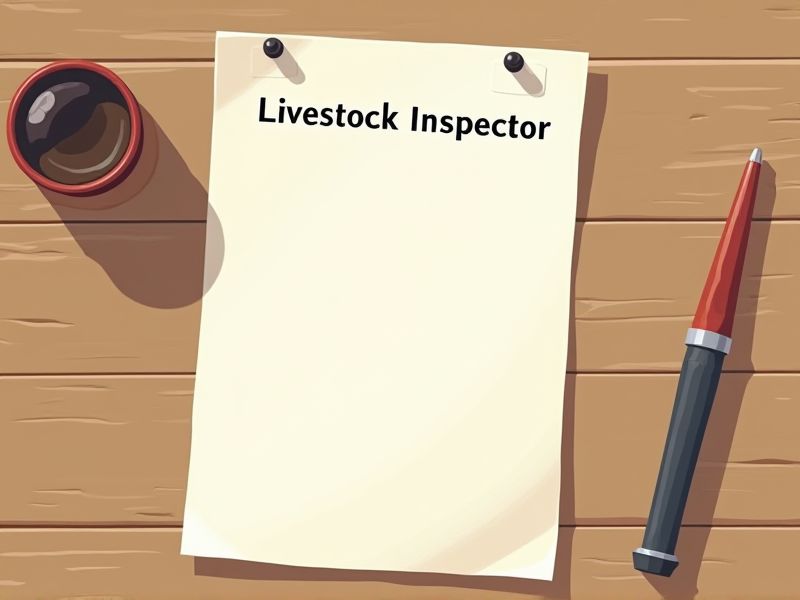
Livestock inspectors play a crucial role in safeguarding public health by ensuring the quality and safety of animals raised for food production. Certification becomes essential as it validates an inspector's competence in adhering to regulatory standards and best practices. Specific certifications equip these professionals with the expertise needed to accurately assess the health and well-being of livestock. Here are essential certifications that might be required for a Livestock Inspector.
USDA Livestock Inspection Certification
Without USDA Livestock Inspection Certification, inspecting livestock could result in unchecked animal health issues, affecting entire agricultural ecosystems. The certification ensures that inspectors have standardized knowledge and skills, promoting nationwide consistency in livestock evaluation. Market access for U.S. livestock products can be restricted in the absence of certified inspections, impacting trade and economy. Consumer trust in the safety and quality of meat depends heavily on the credibility provided by USDA-certified inspections.
Animal Disease Surveillance Certification
Animal Disease Surveillance Certification equips livestock inspectors with the knowledge to detect and manage diseases early, preventing potential outbreaks. This certification ensures inspectors understand disease patterns and biosecurity measures, which is crucial for maintaining public health and safety. With certified skills, inspectors can contribute to the effective control and eradication of diseases, supporting the agricultural economy. The certification process also standardizes procedures across regions, ensuring a consistent and reliable approach to disease surveillance.
Veterinary Public Health Certification
Veterinary Public Health Certification equips livestock inspectors with knowledge in animal disease prevention, crucial to ensuring food safety. It enhances their ability to identify and manage zoonotic diseases, reducing public health risks. Certification also strengthens expertise in regulatory compliance, facilitating adherence to animal welfare standards. As a result, it contributes to maintaining the integrity of the agricultural and food production sectors.
Food Safety and HACCP Certification
Food safety and HACCP certification equips livestock inspectors with the tools to identify potential contamination risks in animal products, ensuring they meet health standards. This certification helps prevent foodborne illnesses by focusing on critical control points in the production process. Inspectors with this training contribute to maintaining consumer trust in the safety of meat and dairy products. By understanding these guidelines, inspectors can more effectively enforce regulations and promote safe handling practices.
Agricultural Biosecurity Certification
Agricultural Biosecurity Certification provides livestock inspectors with the necessary knowledge to prevent the spread of diseases among animal populations. Enhanced biosecurity measures ensure the sustainability and productivity of the agricultural sector by mitigating disease outbreaks. Trained inspectors can effectively identify potential biosecurity risks and implement strategies to manage them. Certification establishes a standardized level of expertise, which builds trust among stakeholders in the agricultural industry.
Animal Welfare and Handling Certification
Animal Welfare and Handling Certification ensures that livestock inspectors are equipped with the necessary knowledge to assess and improve the living conditions of animals, which can lead to healthier livestock and higher-quality products. When inspectors are well-trained in animal welfare, they can identify and mitigate stressors that might otherwise lead to disease and decreased productivity. Certification programs provide standardized guidelines that help maintain consistency and integrity within animal husbandry practices. This ensures that ethical and humane treatment of animals is maintained, which aligns with consumer demand and legal compliance, enhancing public trust in the agricultural industry.
Pesticide Application Certification
Pesticide Application Certification ensures that livestock inspectors understand the safe handling and use of chemicals, which reduces the risk of accidental animal or environmental harm. This certification provides inspectors with up-to-date knowledge on pest control options, promoting more effective and sustainable practices in agriculture. Without such training, inspectors might inadvertently expose livestock and ecosystems to harmful substances, leading to potential economic and ecological damage. Regulatory compliance is necessary to maintain public trust and meet legal standards in agricultural practices.
Environmental Compliance Certification
Environmental Compliance Certification becomes a fundamental requirement for a Livestock Inspector due to the significant environmental impact livestock operations can have, such as water contamination and greenhouse gas emissions. This certification ensures that inspectors possess the knowledge to enforce regulations that protect ecosystems from the adverse effects of improper waste management and other harmful practices. When inspectors are certified, they contribute to promoting sustainable farming practices, which can lead to improved public health and biodiversity conservation. Regulatory bodies mandate this certification to maintain industry-wide standards and minimize negative environmental footprints associated with large-scale livestock production.
Occupational Health and Safety Certification
Occupational Health and Safety Certification ensures livestock inspectors recognize workplace hazards, reducing potential injuries. Knowledge gained from this certification enhances their ability to implement safety protocols effectively. It fosters a culture of safety awareness, leading to better compliance with regulatory standards. Certification contributes to improved worker confidence and job performance in the inspection environment.
Quality Assurance in Agriculture Certification
Quality Assurance in Agriculture Certification is needed for Livestock Inspectors to ensure the safety and health of animals, which directly affects public health and food safety. Consistent standards help maintain consumer trust in livestock products by guaranteeing they meet specific safety and quality criteria. Enhanced compliance with regulations minimizes the risk of disease outbreaks and promotes animal welfare. Proper certification provides inspectors with the necessary skills and knowledge to efficiently evaluate and enforce best practices in livestock management.
Summary
When you gain certifications as a Livestock Inspector, your credibility and professional expertise are likely to increase. This leads to more recognition and trust from employers and peers, potentially resulting in career advancement. Certified knowledge enhances your ability to identify and manage livestock health issues effectively, reducing risks and increasing productivity for farms. Opportunities for specialized roles and higher salary offers often follow as demand for qualified inspectors rises.
